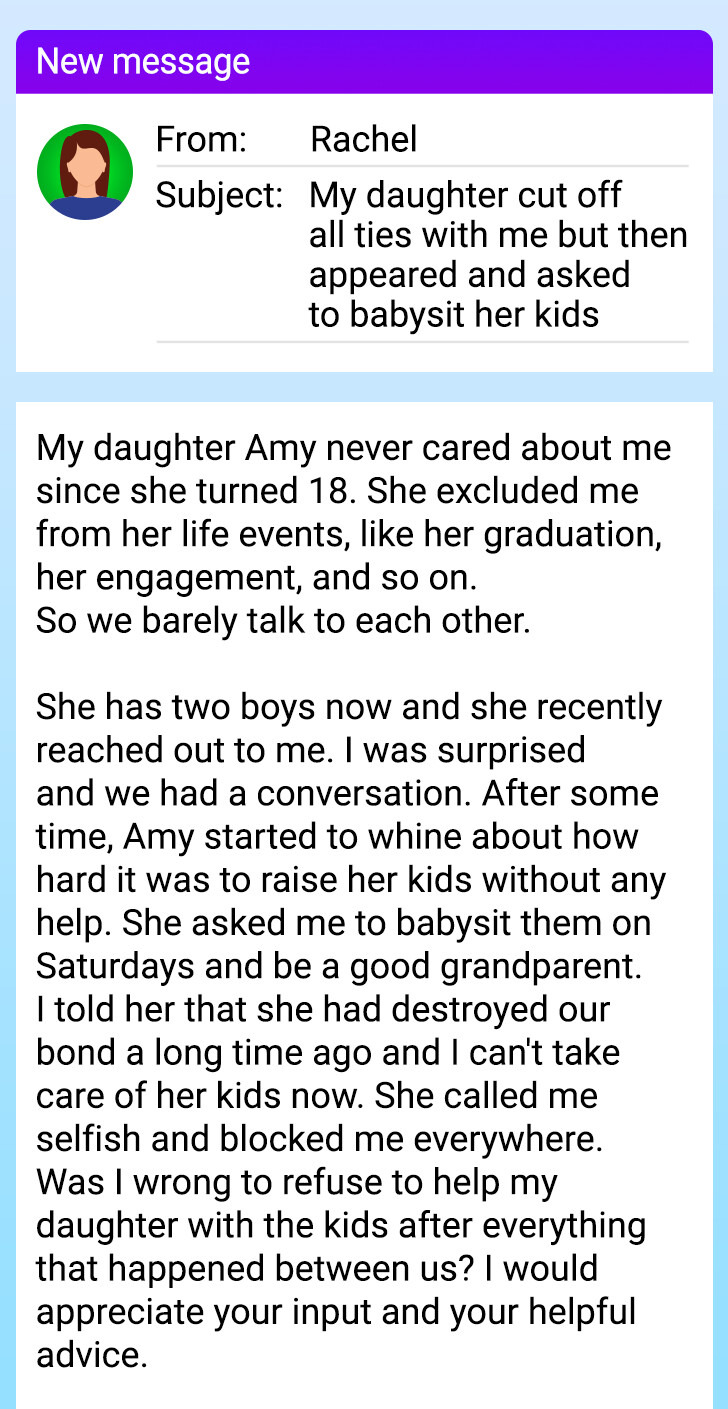It’s really helpful when our relatives take care of our kids without asking for money, especially when we’re busy with work. But we’re not sure if it’s fair to expect this help from our parents, considering the problems we’ve had with them.

Thank you so much for reaching out and opening up about the challenging situation with your daughter. Your concerns are completely valid, and we want you to know that we genuinely empathize with the difficulties you’re facing. Based on the details you’ve shared, we’d like to offer some heartfelt advice to help you navigate through this trying time:
• Know Your Rights and Set Boundaries: You are absolutely not obligated to assist your daughter, especially given the way she has treated you. It’s crucial to recognize your right to set boundaries and prioritize your emotional well-being. Saying no to her unreasonable request is not selfish; it’s an act of self-preservation.
• Understanding the Reasons: Take the time to delve into the reasons behind your daughter’s actions. Try to empathize with her perspective, understanding any insecurities or external influences that may have played a role in her decisions. This understanding can serve as a foundation for rebuilding the relationship.

Open Communication: Initiate an open and honest conversation with your daughter. Express the depth of your love for her and your desire to be a part of her life. Share the hurt you felt when excluded from significant events. Clearly communicate your expectations for rebuilding trust and restoring the relationship.
• Consider the Impact on the Family: Reflect on how your decision will affect other family members, including your other children and grandchildren. Gauge their perspectives and feelings, understanding the potential impact on family dynamics. Seek their support or input, if necessary.
• Remember the Grandchildren: Keep in mind that your grandchildren are not responsible for their mother’s actions. Consider the well-being of these innocent children and the positive influence you could have on their lives. Do you want to be a part of their growth and development?

• Seek Professional Help: Explore the possibility of seeking professional guidance for both yourself and your daughter. Professional intervention may help address underlying issues, heal wounds, and improve communication. Mediation or counseling could facilitate a compromise and agreement.
• Prepare for Consequences: Be aware of the potential consequences of your decision, whether you choose to help or not. Acknowledge the challenges that may arise, such as dealing with your daughter’s attitude or facing criticism. Prepare yourself emotionally for the aftermath, whatever it may be.
• Lean on Your Support System: Remember that you’re not alone. Reach out to family and friends who care about you for advice, comfort, and assistance. Consider joining groups or communities of parents facing similar challenges, where you can find shared experiences, insights, and support.

Your feelings are valid, and we hope that these suggestions provide some guidance and support as you navigate through this complex situation. Before you go, take a look at this interesting story about a mother-in-law who offered to babysit her granddaughter, but requested payment in return.